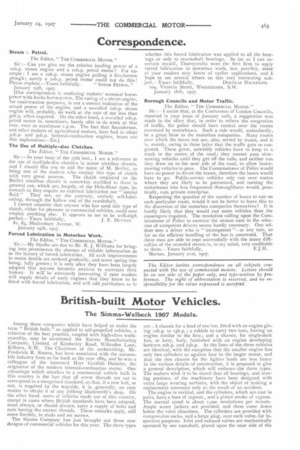Correspondence.
Page 19

If you've noticed an error in this article please click here to report it so we can fix it.
Stearn v. Petrol.
The Editor," THE COMMERCIAL MOTOR."
Sir :—Can you give me the relative hauling power of a ioh.p. steam engine and a ioh.p. petrol motor? For example : I see a ioh.p. steam engine pulling a five-furrow plough ; surely a ioh.p. petrol motor could not do this ! Please explain.—Yours faithfully. " STEAM PETROL." January 19th, 1907.
[Our correspondent is confusing makers' nominal horsepower with brake horse-power. The rating of a steam engine, for road-traction purposes, is not a correct indication of the actual power of the engine, and a so-called ioh.p. steam engine will, probably, do work at the rate of not less than soh.p. when required. On the other hand, a so-called ioh.p. petrol motor is, sometimes, barely able to do work at that rate, even at maximum r.p.m. The fact that Saunderwm, and other makers of agricultural motors, have had to adopt 3oh.p. and 5oh.p. internal-combustion engines, bears out this explanation.—ED.1 The Use of Multiple-disc Clutches.
The Editor, " TIIE COMMERCIAL MOTOR."
Sir :—In your issue of the 17th inst., I see a reference to the use of multiple-disc clutches in motor omnibus chassis, and I should Hke you to add the name of M. Berliet, as being one of the makers who employ this type of clutch with very great success. The clutch employed on the Berliet omnibus chassis is somewhat modified to those in general use, which are, largely, of the Hele-Shaw type, inasmuch as they require no external lubrication nor " special
fluid." They are, on the contrary, entirely self-lubricating, through the hollow end of the crankshaft.
I cannot conceive that anyone who has used this type of clutch, either for pleasure or commercial vehicles, could ever employ anything else. It appears to me to be well-nigh
perfect.—Yours faithfully, J. E. HUTTON. 81, 83, Shaftesbury Avenue, W. January 19th, 1907.
Forced Lubrication in Motorbus Work.
7'he Editor," THE COMMERCIAL MOTOR."
Sir :—My thanks are due to Mr. R. J. Williams for bringing into prominence the absence of reliable information as to the history of forced lubrication. All such improvements in motor details are evolved gradually, and never spring into being, fully grown; it is only after they have been largely adopted that anyone becomes anxious to ascertain their history. It will be extremely interesting if your readers will supply details of early engines that they know to be fitted with forced lubrication, and will add particulars as to whether this forced lubrication was applied to all the bearings or only to crankshaft bearings. So far as I can ascertain myself, Thornycrofts were the first firm to apply forced lubrication to motorbus work, but, possibly, some of your readers may know of earlier applications, and I hope to see several letters on this very interesting sub ject.—Yours faithfully, DOUGLAS MACKENZIE. 109, Victoria Street, Westminster, S.W. January 18th, 1907.
Borough Councils and Motor Traffic.
The Editor, "THE COMMERCIAL MOTOR."
Sir :--I notice that, at the Conference of London Councils, reported in your issue of January loth, a suggestion was made to the effect that, in order to relieve the congestion of traffic, the police should have control over the routes traversed by motorbuses. Such a rule would, undoubtedly, be a great blow to the motorbus companies. Many routes over which the buses run are, also, served by trams, and it is, mainly, owing to these latter that the traffic gets so congested. -These great, unwieldy vehicles have to keep to a track in the centre of the road; they cannot pass slowmoving vehicles until they get off the rails, and neither can. they draw on to the near side of the road, to allow fastermoving vehicles to pass. The Commissioner of Police would have no power to divert the trams, therefore the buses would have to go. Public-service vehicles only run over routes where they are likely to be patronised, and turning the motorbuses into less frequented thoroughfares would, practically, ruin private enterprise.
Respecting the question of the number of buses to run on each particular route, would it not be better to leave this to the discretion of the motorbus compar.ies themselves? It is hardly likely that they would run more vehicles than the passengers required. The resolution calling upon the Commissioner of Police to exercise the utmost care in the selection of competent drivers seems hardly necessary. One seldom sees a driver who is " incompetent "—at any rate, so far as the efficient handling of the bus is concerned. That these men are able to cope successfully with the many difficulties of the crowded streets is, to my mind, very creditable to them.--Yours faithfully, E.J.H.
Merton, January 2 ist, 1907.
The Editor invites correspondence on all subjects connected with the use of commercial motors. Letters should be on one side of the paper only, and type-written by preference. The right of abbreviation is reserved, and no responsibility for the views expressed is accepted.
























